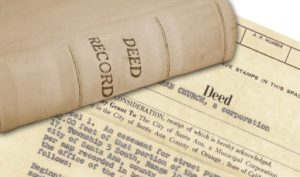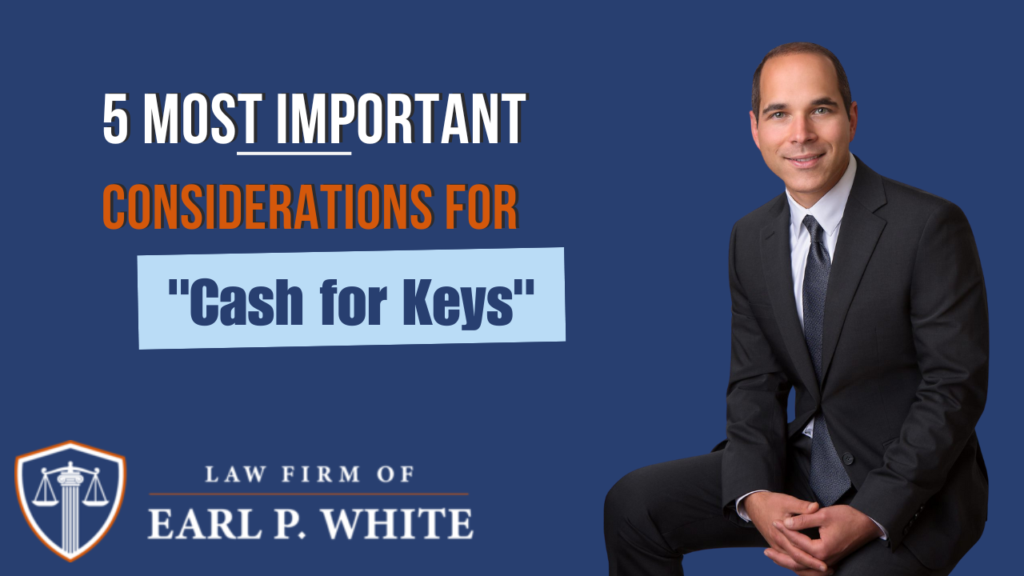Deeds are a legal document that transfers ownership in real estate.
New Jersey recognizes multiple kinds of deeds: bargain and sale, quit claim, sheriff’s deed, deed in lieu of foreclosure, special warranty, and general warranty deeds.
The New Jersey Recording Act requires that deeds must be recorded to be fully enforceable against future claims. The Statue of Frauds establishes requirements for deeds to be effective to transfer ownership.
This entry addresses New Jersey’s intertwining laws pertaining to enforcing, recording, and creating effective deeds.
Definition and Purpose
The purpose of a deed is to transfer title to real property from the grantor to the grantee, and serve as written “notice to the world” establishing the grantee’s property right.
Black Law’s Dictionary 414 stated a deed is “a conveyance of realty; a writing signed by grantor, whereby title is transferred from one to another.” 414 (6th ed. 1990).
New Jersey defines a deed as follows:
1. Study by Attorney. The Buyer or the Seller may choose to have an attorney study this contract. If an attorney is consulted, the attorney must complete his or her review of the contract within a three-day period. This contract will be legally binding at the end of this three-day period unless an attorney for the Buyer or the Seller reviews and disapproves of the contract.
2. Counting the Time. You count the three days from the date of delivery of the signed contract to the Buyer and the Seller. You do not count Saturdays, Sundays or legal holidays. The Buyer and the Seller may agree in writing to extend the three-day period for attorney review.
3. Notice of Disapproval. If an attorney for the Buyer or the Seller reviews and disapproves of this contract, the attorney must notify the Broker(s) and the other party named in this contract within the three-day period. Otherwise this contract will be legally binding as written. The attorney must send the notice of disapproval to the Broker(s) by certified mail, by telegram, or by delivering it personally. The telegram or certified letter will be effective upon sending. The personal delivery will be effective upon delivery to the Broker’s office. The attorney should also inform the Broker(s) of any suggested revisions in the contract that would make it satisfactory.
Checklist: Effective & Recordable
An effective and recordable deed must:
- Be in English or include an English translation (N.J.S.A. 46:26A-3(a)(1));
- Identify the grantor / grantee (N.J.S.A. 25:1-11(a));
- Be signed by the grantor with the name printed underneath (N.J.S.A. 46:26A-3(a)(2) & (4)) & N.J.S.A. 25:1-11(a))
- Include the name and mailing address of the grantee (N.J.S.A. 46:26A-3(a)(5)(d) & N.J.S.A. 25:1-11(a);
- Be notarized (N.J.S.A. 46:26A-3(a)(3));
- Include the name of the person who prepared the deed (N.J.S.A. 46:26A-3(a)(5)(c));
- State the consideration, i.e. the sale price, for the transfer (N.J.S.A. 46: 15-6(a));
- Contain the lot and block number, or state that none exists;
- Contain a legal description of the property, such as the metes and bounds description prepared by a surveyor or the account number of the property (N.J.S.A. 25:1-11(a)(1)); and
- Describe the “nature of the interest”, i.e. the rights being received by the grantee (N.J.S.A. 25:1-11(a)(1).
Requirements for a Valid Deed
Deeds must comply with New Jersey’s Statute of Frauds to effectively transfer ownership from transferor to transferee.
The Statute of Frauds offers several methods for an effective transfer.
N.J.S.A. 25:1-11(a)(1). Deeds are effective to transfer ownership where they establish in writing:
- A description of the real estate sufficient to identify, such as the legal description;
- Nature of the interest, i.e., fee simple, tenants in common, joint tenants;
- Fact of the transfer;
- Identity of the transferor and transferee; and
- Signed by or on behalf of the transferor.
N.J.S.A. 25:1-11(a)(2). Even where a deed has not met written requirements, it is effective to transfer ownership if the transferor has:
- Placed the transferee in possession of the real estate as a result of the transaction; and
- Either the transferee paid all or part of the consideration for the transfer, or reasonably relied on the transfer to their detriment.
N.J.S.A. 25:1-13(b). Alternatively, if the requirements of N.J.S.A. 25:1-11(a)(1) or (a)(2) are not satisfied, a transfer may still be enforceable as an agreement if a party can prove by clear and convincing evidence:
- a description of the real estate sufficient to identify it;
- the nature of the interest to be transferred;
- the existence of the agreement; and
- the identity of the transferor and the transferee.
Incorporation by Reference. Description requirements can be satisfied by referencing another recorded document that sufficiently describes the property. Wells Fargo Bank, N.A. v. Cicenia, No. A-2189-16T4 (Super. Ct. App. Div. July 17, 2018) (“The purpose of a description of land is to identify the subject-matter of the grant, which may be done either by describing it in words at length, or by referring the reader to some other deed or record containing such a description.”)
Time of Transfer. Ownership transfers when the following conditions are met: (1) execution and delivery of the deed by the grantor, (2) acceptance by the grantee, with (3) corresponding intents to deliver and accept. The deed does need to be recorded to pass title. H.K. v. Dept. of Human Services, 184 N.J. 367 (N.J. 2005).
Competency. Grantors must be 18 years of age, and have sufficient mental capacity to reasonably know and understand the nature and character of the transaction at the time of the execution of the deed. N.J.S.A. 9:17B-1; Blake v. Brennan, 61 A.2d 916 (Super. Ct. 1948).
“Race Notice” and the New Jersey Recording Act
Although a “valid” deed effectively transfers ownership, validity alone will not protect the grantee’s interest against future claims.
Deeds must be recorded to be fully enforceable against future claims under the New Jersey Recording Act. Recording occurs by filing copies in the county where the property sits.
Later recorded documents are given effect over preexisting unrecorded documents.
Priority Generally
New Jersey is a “race notice” state.
Where multiple parties make a claim to the property, the first recorded document is given priority. Priority is the order that property right claims (such as by buyers or lenders) will be enforced.
See United States Bank Nat’l Ass’n v. Wishnia, No. A-1706-16T4 (Super. Ct. App. Div. Sep. 7, 2018)(“New Jersey is considered a ‘race-notice’ jurisdiction, which means that as between two competing parties the interest of the party who first records the instrument will prevail so long as that party had no actual knowledge of the other party’s previously-acquired interest.”)
For example, the current owner sells his property to a buyer and the deed is never recorded. In the future, the prior owner executes a second deed transferring ownership to a second buyer without disclosing the unrecorded first deed. The second buyer records the second deed. Although the first buyer received property rights earlier, the second buyer will be deemed owner because his deed was first recorded.
First in time, first in right.
The New Jersey Recording Act
The New Jersey Recording Act establishes the law of notice and priorities discussed above.
The purpose of the Recording Act is “to compel the recording of instruments affecting title, for the ultimate purpose of permitting purchasers to rely upon the record title and to purchase and hold title with confidence.” U.S. Bank Nat’Lass’N v. Wishnia, No. A-1706-16T4 (N.J. Super. Sep. 7, 2018). Courts resolve questions of title “in the way that will best support and maintain the integrity of the recording system.” Id.
N.J.S.A. 46:26A-12(a) established that the act of recording serves as notice to future claimants:
Any recorded document affecting the title to real property is, from the time of recording, notice to all subsequent purchasers, mortgagees and judgment creditors of the execution of the document recorded and its contents.
Parties are charged with constructive notice of properly recorded documents. Constructive notice arises “from the obligation of a claimant of a property interest to make reasonable and diligent inquiry as to existing claims or rights in and to real estate.” Ditech Fin. v. Migliaccio, No. A-0478-18T4 (Super. Ct. App. Div. Feb. 11, 2020).
A “reasonable and diligent inquiry” includes a title and lien search, which is an examination of public records to determine a property’s ownership and find out what claims or liens are on the property.
N.J.SA. 46:26B-12(b) and (c) established the “priority” of first recorded deeds and documents:
b. A claim under a recorded document affecting the title to real property shall not be subject to the effect of a document that was later recorded or was not recorded unless the claimant was on notice of the later recorded or unrecorded document.
c. A deed or other conveyance of an interest in real property shall be of no effect against subsequent judgment creditors without notice, and against subsequent bona fide purchasers and mortgagees for valuable consideration without notice and whose conveyance or mortgage is recorded, unless that conveyance is evidenced by a document that is first recorded.
The following documents impacting real property also may be recorded: powers of attorney, leases for life or not less than two years, mortgages, liens, assignments, discharges, releases, tax liens, use restrictions, options, rights of first refusal, judgments, settlements, condominium master deeds and cooperative master declarations. N.J.S.A. 46:26A-2.
Title Insurance
Given New Jersey’s law on recording, title insurance is incredibly important to protect buyers of homes or investment property.
Title insurance will pay out a claim to a buyer if their deed is deemed lower in priority. Even with a search of the “chain of title” [the history of recorded documents], human error, fraud, or misunderstandings can unfortunately result in losing a property.
Mortgage lenders will require title insurance with the lender as the beneficiary. Buyers – although it costs a small amount more – should secure their own title insurance policy on any major purchase.
A title and lien search is advisable even for family and friends transferring ownership for free. An accurate understanding of recorded documents and liens before taking title can prevent future problems.
The matter of Brancato v. Martin, No. A-2323-15T1 (N.J. Super. Nov. 28, 2017) provides insight on the importance of title searches even among family and friends.
In Brancato, two persons (Brancato and Martin) purchased a condo as tenants in common and recorded the deed. Martin fell upon hard economic times, falsely told a family friend he was sole owner, and executed a deed purporting to sell full ownership to that family friend. The family friend did not conduct a title search and thus was unaware of Brancato’s 50% ownership when he purchased the condo. The family friend was deemed to be a tenant in common with Brancato.
Requirements for Recording a Deed
All documents – including deeds – to be recorded must meet the following conditions to be recorded:
- Be in English or accompanied by an English translations. N.J.S.A. 46:26A-3(a)(1).
- Signed. N.J.S.A. 46:26A-3(a)(2).
- Notarized. N.J.S.A. 46:26A-3(a)(3).
- Names printed beneath all signatures. N.J.S.A. 46:26A-3(a)(4).
Deeds must also include the following to be recorded:
- Reference to the lot and block number or the account number of the real property (or state if none has been assigned). N.J.S.A. 46:26A-3(a)(5)(b).
- The name of the person who prepared the deed. N.J.S.A. 46:26A-3(a)(5)(c).
- The mailing address of the grantee. N.J.S.A. 46:26A-3(a)(5)(e).
- A statement of the true consideration for the transfer. N.J.SA. 46:15-6(a).
- The “nature of the interest”, i.e. the rights being transferred (N.J.S.A. 25:1-11(a)(1).


